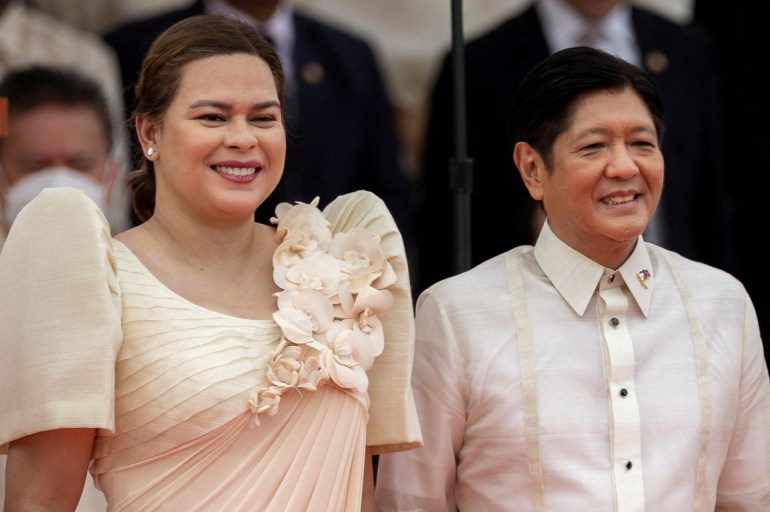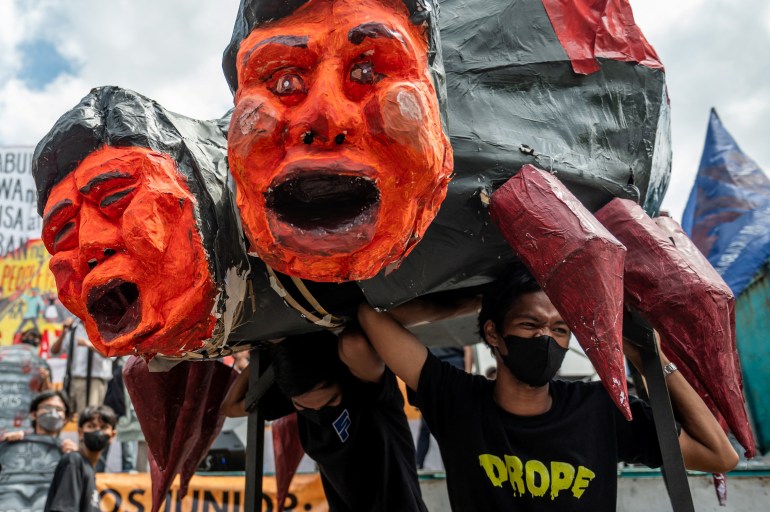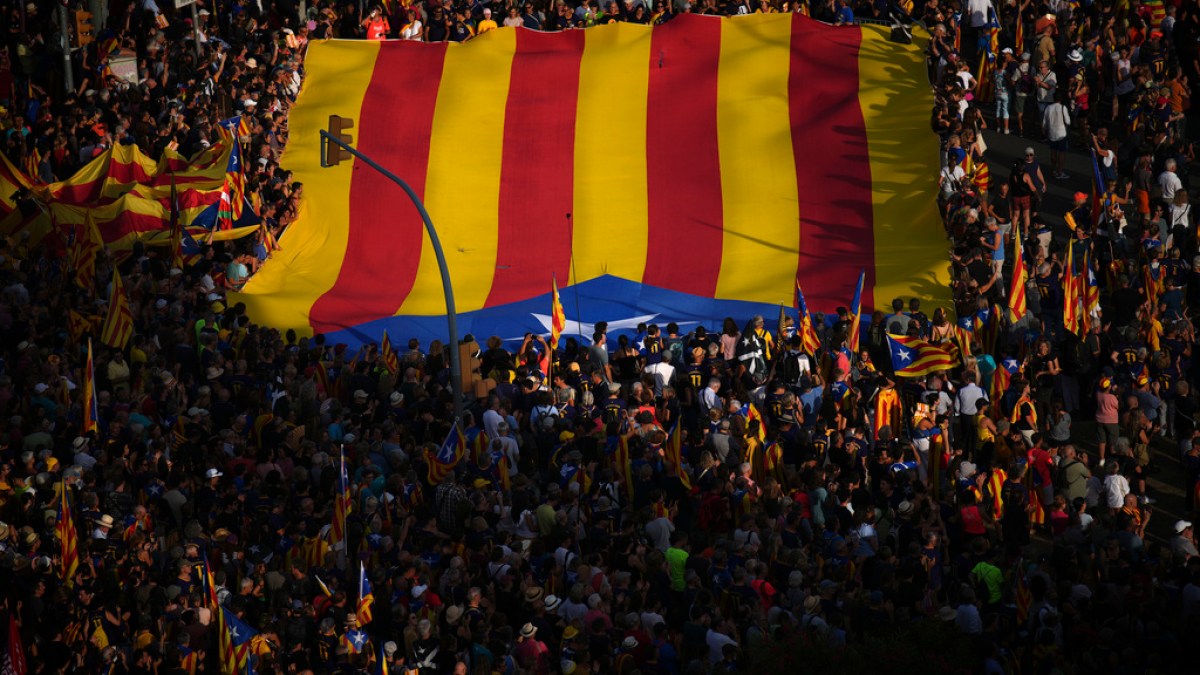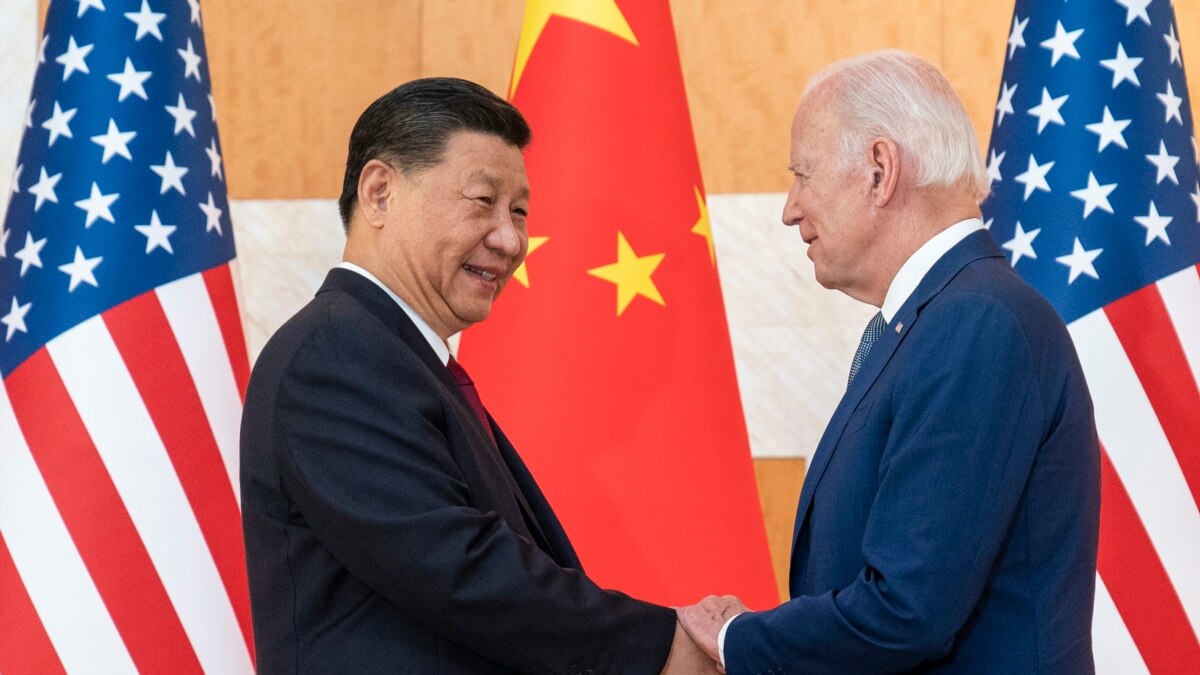Manila, Philippines — Sara Duterte-Carpio, the Philippine vice president and the odds-on favorite to succeed President Ferdinand Marcos Jr., is grappling with an impossible feud — between the president and her own father.
Former President Rodrigo Duterte accused Marcos of drug use last month and publicly floated the idea of a military coup to oust the president. Last week he proposed secession from Mindanao, a southern island and base of his political power.
Marcos initially responded that his predecessor’s judgment had been impaired by his use of the synthetic opioid fentanyl, which he previously admitted to using to recover from a motorcycle accident. He also said the call for a separate Mindanao was “doomed to fail” and his national security adviser threatened to use force to suppress any attempts at secession.
The ongoing political dispute has put Duterte-Carpio in a bind and threatens to unravel the alliance she and Marcos formed before their election in 2022.
She recently parted ways with the president on several issues, including those related to government Resumption of peace talks with communist rebels and a ongoing investigation into her father’s deadly drug war from the International Criminal Court.
But the Marcos government’s efforts to amend the Philippine constitution have created the biggest rift between the country’s two most prominent political families.
Marcos says he wants to remove existing constitutional restrictions that restrict foreign investment. But critics in the Duterte camp accuse Marcos of planning to switch the country to a parliamentary system and install House Speaker Martin Romualdez, Marcos’ cousin and close ally, as his successor before the next presidential election in 2028.

Duterte-Carpio has tried to remain neutral even as her father’s attacks on the president continued. She was the only member of the Duterte family to appear with Marcos last week when the president visited flood-affected areas of Mindanao.
“She wants to keep the Marcos-Duterte alliance together,” said Walden Bello, an associate professor of sociology at the State University of New York at Binghamton and a former member of the Philippine House of Representatives. “This kind of political arithmetic was key in 2022, and it will be key in 2028 too.”
“Not just her father’s daughter”
The Marcos-Duterte alliance was formed after Duterte-Carpio shocked the country by deciding not to run for president in 2022 despite being the favorite.
Instead, she defied her father’s wishes and decided to run for vice president and support Marcos’ presidential candidacy – in the Philippines, the president and vice president are elected separately.
Their decision all but assured victory for the two and prevented a surprise victory for opposition candidate Leni Robredo, the former vice president and vocal critic of Duterte’s war on drugs.
“It was a perfect marriage for the 2022 election,” said Cleve Arguelles, managing director of the polling institute WR Numero Research.
It was also an early sign of Duterte-Carpio’s autonomy from her father, whom she succeeded as mayor of Davao, Mindanao’s largest city. During her time as mayor, she replaced staff loyal to her father and forged her own alliances, including a tie with Imee Marcos, the current president’s sister. The two remain politically connected.
“She’s not just her father’s daughter,” Arguelles said.
Duterte-Carpio also cuts a different figure than many of the country’s previous prominent female politicians, who have often portrayed themselves as motherly figures. She made headlines as mayor of Davao beat a court sheriff. She often wears military uniforms and has joked that she should cut her hair short if she wants to appear tough.
After her election victory, Duterte-Carpio publicly said she wanted to be named defense secretary – in the Philippines it is common for the vice president to also hold a Cabinet post – but Marcos named her education secretary, in what was widely seen as a snub.
“That was a very quick lesson that you are not president,” Arguelles said. “There is no way to divide presidential powers.”
Last year, Duterte-Carpio faced intense criticism for requesting about $11.6 million in “confidential funds” in the 2024 national budget to be used without oversight.
The controversy saw her public approval rating drop from 84 percent in June 2023 to 73 percent in September – still higher than Marcos’s, which recorded 65 percent approval. There was also the impression that Marcos’ allies, particularly spokesman Romualdez, were plotting against them.
“She’s kind of stuck in this alliance,” Arguelles said. “She can’t completely abandon the government because she knows it will be deadly.”
“Double game”
Duterte-Carpio’s father and her younger brother, current Davao Mayor Sebastian Duterte, have continued to pressure the president during their speeches in Mindanao – and the country’s economic realities may help their cause.
Inflation fell to 2.8 percent in January, compared to 3.9 percent in December. However, rice inflation reached 22.6 percent, its highest since 2009, threatening Marcos’ campaign promise to stabilize prices for staple foods.
The Dutertes “are really going to play this up,” Bello said, using the furor over rice prices to press their opposition to a constitutional amendment that many presidents – including Duterte – have tried unsuccessfully since it was ratified in 1987.
Marcos insists his motivations are economic and aimed at lifting restrictions on foreign ownership of companies operating in the Philippines. But that has not dispelled speculation that it is a ploy to block a Duterte-Carpio election campaign by switching to a parliamentary system in which elected representatives would form a coalition and elect a prime minister.
“It does exist [already] There is a lot of foreign investment coming in,” Bello said. While companies have learned to work around the current restrictions, “it is corruption and instability that worry them”.
“And [constitutional change] will lead to such instability at this point,” he said. “It really stirred up the political scene and focused people on the fight between the Marcoses and Dutertes.”

Duterte-Carpio was cautious in expressing her own opposition to constitutional change, directing her public anger at Romualdez rather than Marcos. In recent weeks, both Marcos and Duterte-Carpio have insisted they continue to maintain good relations.
But political maneuvering by the Marcos camp is putting pressure on Duterte-Carpio, who is not a natural politician, said Tony La Vina, deputy director of climate policy and international relations at the Manila Observatory.
“Everything is black and white [Duterte-Carpio], from what we saw,” he said. “She has no patience for discourse.”
The Dutertes are also increasingly worried about what will happen next ICC investigation into the drug war.
The Hague-based court could issue an arrest warrant for Duterte in the coming months – and while Marcos has said the Philippines would not cooperate with the ICC, he also said its investigators could enter the country on their own terms.
Duterte-Carpio “was not seeking an early separation, but I think things have gotten out of control,” Bello said. “She will try to play this double game until the end.”
This has resulted in the opposition weakening and Filipino voters becoming an “audience” for a family feud, Bello said. “It is the politics of spectacle that will prevail in the next few years.”






Recent Comments